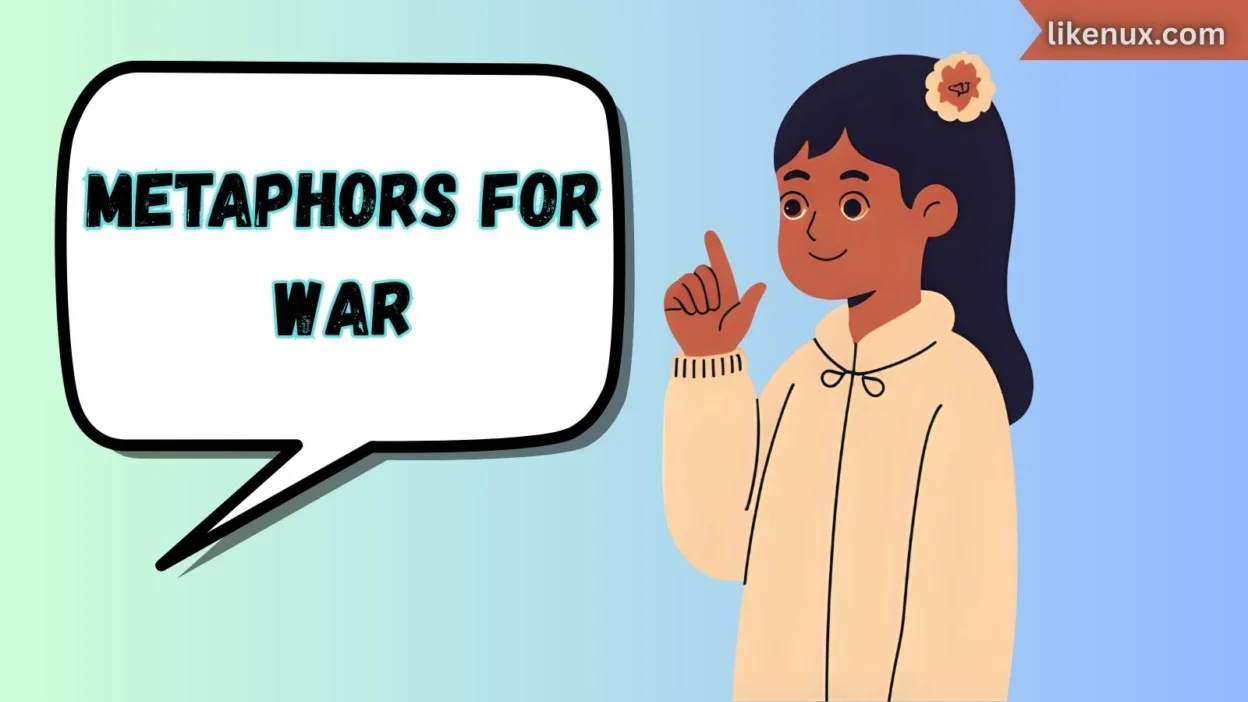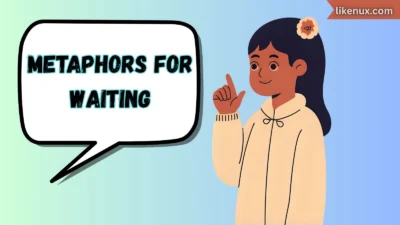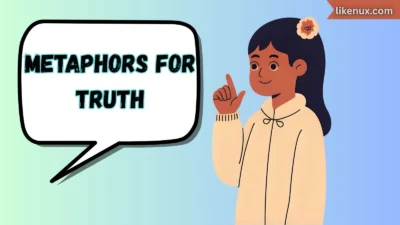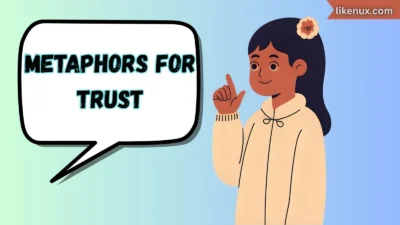War has always been one of the most difficult and emotional subjects to talk about. For centuries, writers, poets, and leaders have turned to metaphors to express its pain, chaos, and consequences. Using metaphors for war can help us describe the experience with sensitivity, depth, and meaning rather than simply focusing on violence. Metaphors for War.
In this article, I’ll share 25 thoughtful metaphors for war, along with their meanings, best uses, and alternative ways to say them. These metaphors are designed to help you communicate with warmth, empathy, and care, whether you are writing an essay, speech, or even a heartfelt message.
1. War is a Storm
Meaning: A sudden force of destruction that disrupts everything in its path.
In a sentence: The war swept across the land like a storm, leaving chaos behind.
Best use: To describe the unpredictable and overwhelming nature of conflict.
Other ways to say: Tempest, whirlwind, hurricane of violence.
Read More: Metaphors for Water
2. War is a Fire
Meaning: It spreads quickly, consumes everything, and leaves ashes behind.
In a sentence: The fire of war burned through villages and hearts alike.
Best use: To highlight how conflict escalates and destroys.
Other ways to say: Blaze, inferno, flames of destruction.
3. War is a Machine
Meaning: A system that operates without compassion, grinding people into parts.
In a sentence: The war machine demanded endless sacrifice.
Best use: To emphasize the cold, mechanical brutality of organized conflict.
Other ways to say: Engine of destruction, military apparatus.
4. War is a Disease
Meaning: Something that infects societies and spreads suffering.
In a sentence: The disease of war plagued the nation for years.
Best use: To show how war contaminates and corrupts.
Other ways to say: Plague, epidemic, infection of conflict.
5. War is a Wild Beast
Meaning: Uncontrollable and hungry for destruction.
In a sentence: The beast of war devoured all in its path.
Best use: To illustrate the brutal and untamed nature of war.
Other ways to say: Monster, predator, dragon.
6. War is a Shadow
Meaning: It looms over people, darkening their lives.
In a sentence: The shadow of war haunted the generation.
Best use: To convey the constant presence and fear of conflict.
Other ways to say: Darkness, cloud, veil.
7. War is a Game of Chess
Meaning: A strategic battle of moves and counter-moves.
In a sentence: For the generals, war was nothing more than a chessboard.
Best use: To describe the strategic, calculated side of war.
Other ways to say: Strategic contest, power game.
8. War is a Dance of Death
Meaning: A destructive performance with tragic consequences.
In a sentence: Soldiers moved in the dance of death called war.
Best use: When writing poetically or symbolically.
Other ways to say: Deadly waltz, fatal choreography.
9. War is a Cage
Meaning: It traps people and nations inside suffering.
In a sentence: The cage of war held them prisoner.
Best use: To stress the loss of freedom during war.
Other ways to say: Prison, confinement, chains.
10. War is a Volcano
Meaning: Pressure builds until it violently erupts.
In a sentence: The volcano of war erupted after years of tension.
Best use: To describe long-brewing conflicts.
Other ways to say: Explosion, eruption, outburst.
11. War is a Wound
Meaning: A deep hurt that takes generations to heal.
In a sentence: The wound of war scarred the nation forever.
Best use: To describe the emotional or historical pain left behind.
Other ways to say: Scar, gash, injury.
12. War is a Desert
Meaning: Empty, lifeless, and barren after destruction.
In a sentence: The war turned once-rich lands into a desert.
Best use: To emphasize the emptiness and loss.
Other ways to say: Wasteland, emptiness, void.
13. War is a River of Blood
Meaning: Endless flow of lives lost.
In a sentence: A river of blood flowed through the battlefield.
Best use: To stress mass casualties and sacrifice.
Other ways to say: Sea of death, tide of blood.
14. War is a Puppet Master
Meaning: Leaders pull strings while others suffer.
In a sentence: The puppet master of war manipulated young soldiers.
Best use: To criticize political manipulation.
Other ways to say: Manipulator, controller, hidden hand.
15. War is a Thief
Meaning: It steals lives, peace, and futures.
In a sentence: War is the thief that robs nations of tomorrow.
Best use: To stress loss and tragedy.
Other ways to say: Robber, plunderer, destroyer.
16. War is a Mirror
Meaning: It reflects the darkest parts of humanity.
In a sentence: The war was a mirror of human cruelty.
Best use: When exploring psychological or moral lessons.
Other ways to say: Reflection, truth-teller.
17. War is a Furnace
Meaning: It consumes everything, forging change in the heat.
In a sentence: The furnace of war reshaped the nation.
Best use: To describe destruction but also transformation.
Other ways to say: Crucible, forge, melting pot of fire.
18. War is a Battlefield of Minds
Meaning: Not just physical, but also a war of ideas.
In a sentence: The battlefield of minds raged during the Cold War.
Best use: To describe propaganda, ideology, or information wars.
Other ways to say: War of ideas, psychological conflict.
19. War is a Maze
Meaning: Confusing, full of traps, with no easy escape.
In a sentence: The maze of war left leaders lost in choices.
Best use: To stress the complexity of conflict.
Other ways to say: Labyrinth, puzzle, entanglement.
20. War is a Funeral
Meaning: A constant mourning for countless lives.
In a sentence: The war became a never-ending funeral march.
Best use: To highlight the sorrow of loss.
Other ways to say: Mourning, lament, procession of death.
21. War is a Tidal Wave
Meaning: A force that crashes and sweeps away everything.
In a sentence: The tidal wave of war consumed the coast.
Best use: To express unstoppable momentum.
Other ways to say: Tsunami, flood, surge.
22. War is a Poison
Meaning: It seeps in, corrupting hearts and societies.
In a sentence: The poison of war lingered long after the fighting ended.
Best use: To stress lasting negative effects.
Other ways to say: Venom, toxin, contagion.
23. War is a Nightmare
Meaning: A terrifying dream that feels inescapable.
In a sentence: The nightmare of war haunted survivors.
Best use: To capture the emotional trauma of conflict.
Other ways to say: Horror, bad dream, haunting.
24. War is a Broken Mirror
Meaning: It shatters lives and reflects only fragments.
In a sentence: The broken mirror of war showed a fractured world.
Best use: To stress the irreparable damage of war.
Other ways to say: Shattered glass, fractured image.
25. War is a Clock
Meaning: It counts down to inevitable tragedy.
In a sentence: The ticking clock of war moved closer to destruction.
Best use: To describe the build-up to conflict.
Other ways to say: Timer, countdown, hourglass.
FAQs
1. Why do we use metaphors to describe war?
Because metaphors help us humanize and simplify complex emotions, making discussions about war more relatable and impactful.
2. Are metaphors for war only negative?
Mostly yes, because war is destructive. However, some metaphors also highlight resilience, transformation, and lessons learned.
3. Can I use war metaphors in academic writing?
Yes, but carefully. They work best in essays, speeches, and literary analysis rather than in strictly factual reports.
4. What are the most powerful war metaphors?
“War is a storm,” “War is a fire,” and “War is a thief” are among the most commonly used and impactful metaphors.
5. How can metaphors make my writing better?
They engage emotions, paint vivid pictures, and connect readers to the subject matter in a way plain words cannot.
Conclusion
War is one of the hardest realities to talk about, yet through metaphors, we find ways to express its pain, consequences, and meaning. From storms and shadows to thieves and broken mirrors, each metaphor allows us to describe war in ways that feel human, empathetic, and unforgettable.
If you’re writing, teaching, or simply reflecting on history, these 25 metaphors for war can help you find the right words with both power and compassion.

David Robert is a passionate innovator driven by creativity, vision, and purpose. He turns bold ideas into impactful realities through focus, leadership, and dedication.



